
New “Study” Claiming Brain Differences in “Troubled Teens” is Totally Bogus—
News headlines today are touting a “new study” that shows boys with “Conduct Disorder” have differences in “size and structure of their brain” that MAY be linked to behavior. Before we point out just how lame this new study is on a scientific level – let’s start with the fact that the study was funded by Wellcome Trust. If the name Wellcome sounds familiar it’s because it was named after, and established in order to administer the fortune of American born pharmaceutical giant, Sir Henry Wellcome (Glaxo-Wellcome later became GlaxoSmithKline). Secondly, the study authors admitted, they couldn’t conclude a thing….





SHARE YOUR STORY/COMMENT: